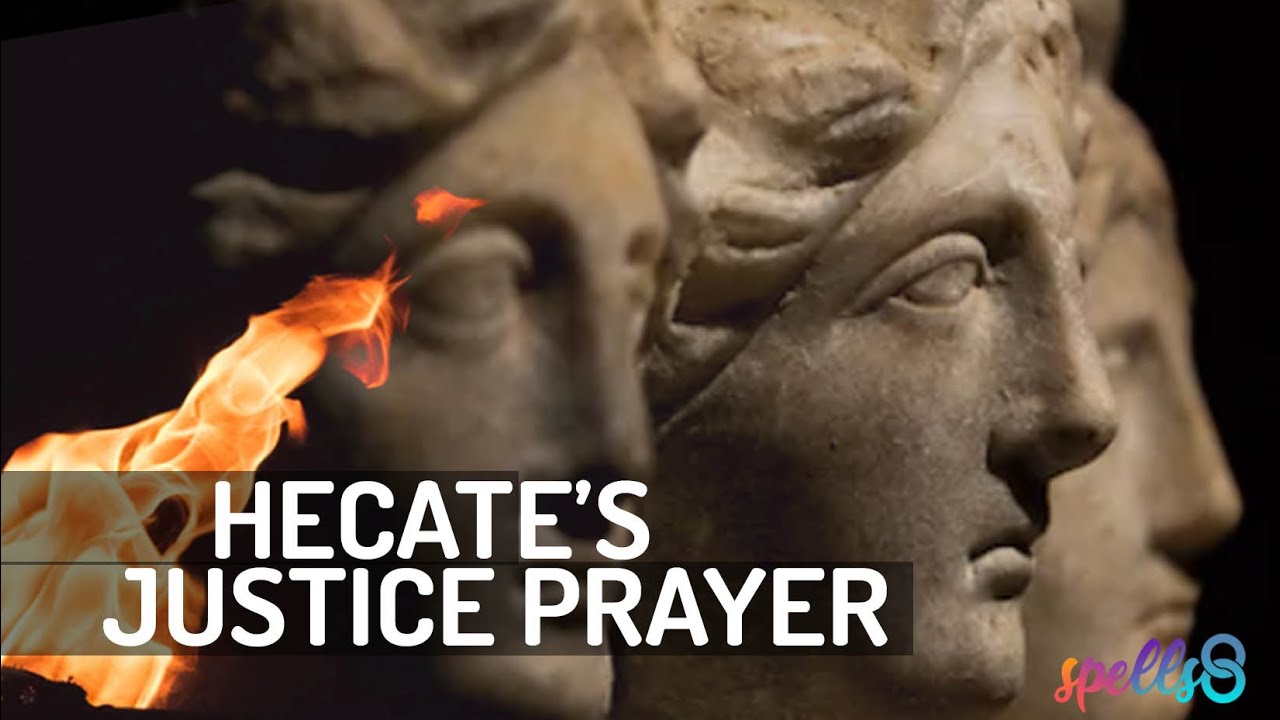✨? Hecate Invocation Chant ? The Wiccan Goddess of Justice
? Light a black candle during this devotional.
Daily Candle Rituals: https://spells8.com/wiccan-devotional/
Hecate (or Hekate) is the Divinity of the Underworld who is called the Queen of the night and Goddess of the crossroads. Her three faces turn in all possible directions, and she is often seen with torches.
Some believe that Hecate grants wealth and success to those whose prayers she receives favorably. In the same way, the result of war and victory in games may depend on her, who grants glory to whomever she pleases. This power resembles that of Witchcraft, as Medea – a powerful priestess of Hecate – used to handle magical herbs and poisons with this skill.
This Hecate invocation ritual was inspired by the Orphic hymn to Hecate from the late Hellenistic (ancient Greek) period. Summoning Hecate with a chant can be useful within a justice spell, a protection ritual and other types of spellwork. Many Wiccans work with Hecate as their patron Goddess because of her cultural link to Witchcraft and witches in the West.
Offerings to Hecate: https://spells8.com/hecate-devotional/
In Ancient Greece, she was seen as the counterpart of Artemis, who represented the moonlight and the splendor of the night, while Hecate, on the other hand, represented darkness and night terrors. Devotional to Artemis: https://spells8.com/artemis-devotional/
The elders told the younger ones that in the villages, in the moonless nights, she wandered through the land with her ghost dog howling, warning the peasants of the presence of the goddess. She sent humans nocturnal fears, ghostly apparitions or apparitions. Hecate was the goddess of sorcery and the arcane, being worshiped by wizards and witches above all, who in her honor, made a sacrifice of lambs and black dogs at the end of each moonless night.
She is also a goddess of the underworld, often observed with three completely different faces; the first being that of a horse, the second a dog, and the third one in the center, was the woman.
Rituals to Hecate were not only performed to worship the goddess but also with the purpose of honoring loved ones who have abandoned this world. While this kind of rituals can be done at any time of the year, they traditionally happen around August 13 and November 30.
Hecate for some, is not considered an originally Greek goddess, because of her roots in Asia Minor. The place of origin of her cult is very uncertain, but it is claimed that she had numerous followers in Thrace.
Hecate’s most important sanctuary was in Lagyna, a city-state, where a famous temple dedicated to Hecate attracted large festive gatherings every year along with many foreigners. Slowly, the worship of Hecate took over Greece and she is still venerated in many parts of the world by neo pagans.



![Private: [ID: NeLgNVsC8NU] Youtube Automatic](https://bizimtube.com/wp-content/uploads/2020/11/private-id-nelgnvsc8nu-youtube-a-236x133.jpg)
![Private: [ID: Hfd6_WtScRg] Youtube Automatic](https://bizimtube.com/wp-content/uploads/2020/11/private-id-hfd6wtscrg-youtube-au-236x133.jpg)
![Private: [ID: kze8Vscv2zY] Youtube Automatic](https://bizimtube.com/wp-content/uploads/2020/11/private-id-kze8vscv2zy-youtube-a-236x133.jpg)
![Private: [ID: MyloaV7mICg] Youtube Automatic](https://bizimtube.com/wp-content/uploads/2020/11/private-id-myloav7micg-youtube-a-236x133.jpg)
![Private: [ID: Ry9Cagigrng] Youtube Automatic](https://bizimtube.com/wp-content/uploads/2020/11/private-id-ry9cagigrng-youtube-a-236x133.jpg)
![Private: [ID: iPbkoCx_f7k] Youtube Automatic](https://bizimtube.com/wp-content/uploads/2020/11/private-id-ipbkocxf7k-youtube-au-236x133.jpg)
![Private: [ID: _KMff8vsO_E] Youtube Automatic](https://bizimtube.com/wp-content/uploads/2020/11/private-id-kmff8vsoe-youtube-aut-236x133.jpg)
![[ID: ylO_-c7s-BQ] Youtube Automatic](https://bizimtube.com/wp-content/uploads/2020/11/id-ylo-c7s-bq-youtube-automatic-236x133.jpg)
![[ID: uD5YCNbqaio] Youtube Automatic](https://bizimtube.com/wp-content/uploads/2020/11/id-ud5ycnbqaio-youtube-automatic-236x133.jpg)
![[ID: V53oxovEFiY] Youtube Automatic](https://bizimtube.com/wp-content/uploads/2020/11/id-v53oxovefiy-youtube-automatic-236x133.jpg)
![[ID: IPbI2zhDEb0] Youtube Automatic](https://bizimtube.com/wp-content/uploads/2020/11/id-ipbi2zhdeb0-youtube-automatic-236x133.jpg)
![[ID: CiMkhVCzLsY] Youtube Automatic](https://bizimtube.com/wp-content/uploads/2020/11/id-cimkhvczlsy-youtube-automatic-236x133.jpg)